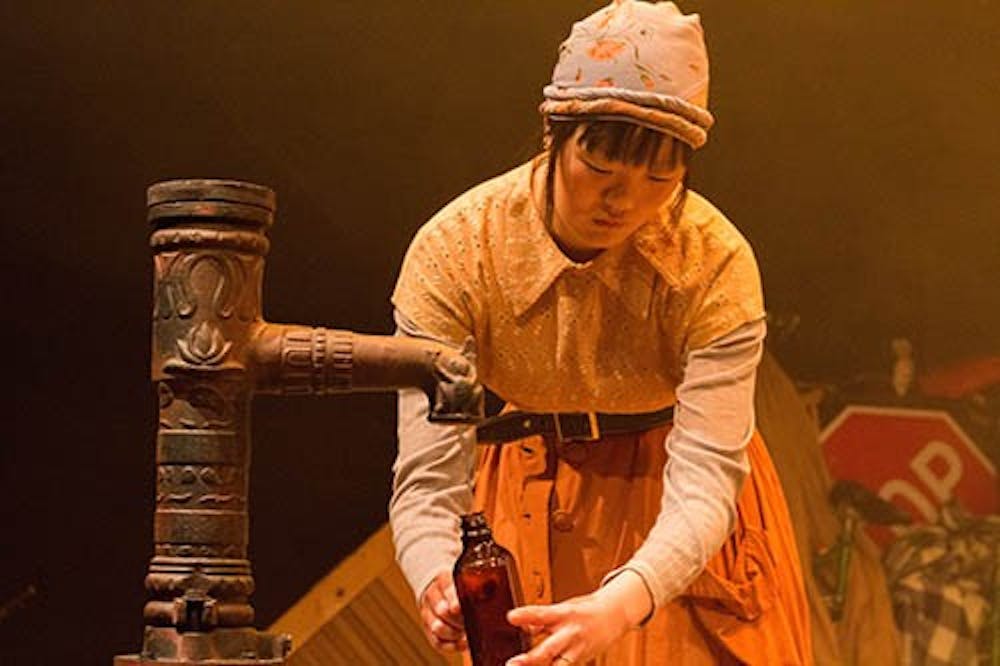Fog filled a dimly lit Strother Theatre. The faint sound of running water hitting the ground was the only sound breaking the silence.
Nic Eastlund, a junior musical theatre major, slowly dragged a baby carriage behind him as he entered the stage. Ropes connected him to the carriage and to Katie Stofko, a senior acting major, walking behind the carriage.
Their feet barely lifted off the ground and they moved as if in slow motion. Minutes passed as they walked to the middle of the stage, an act that would, in normal speed, take less than 30 seconds.
Eastlund and Stofko rehearsed for their role in “The Water Station,” which opens tonight in Strother Theatre. The piece is portrayed in slow tempo, a theatrical technique where actors move slower than regular speed, and the actors don’t utter a word.
“I still haven’t totally figured out how to prepare myself to walk on stage,” Eastlund said. “I’ve read novels and played Sudoku, but ultimately I have to seclude myself and slow by breathing and mind.”
Set after an unknown disaster, the plot centers around travellers who come across a water station.
This is the first slow-tempo piece to be performed at Ball State, and director Drew Vidal expects it to challenge the audience’s perceptions of what plays are. Without the use of words, the audience has freedom to interpret what happens on their own terms, Vidal said.
“To me, as an audience member, I don’t want to be told what to think,” he said. “People can walk out of here with different ideas of what happened.”
Students were challenged while working on “The Water Station.” It was the first time some students were exposed to slow tempo and the absence of dialogue.
“Everyone has been so willing to learn and keep their parts as fresh as possible,” Vidal said. “We have ran it so many times that they know the movements. It’s what happening in their heads that is going to keep it fresh each night.”
Sophomore journalism major Sara Dreibelbis had never been exposed to slow tempo before auditioning for “The Water Station.”
“It’s such a unique concept to deal with,” said Dreibelbis. “Because we move so slow on stage, our minds have to concentrate on other things, instead of what we have to do with our bodies and what the audience is seeing.”
Dreibelbis said it’s helpful to slow her breathing and mind while she is on stage.
“My thoughts aren’t moving in slow motion, but I concentrate on everything for a really long time,” Dreibelbis said. “If I see a yellow shoe, I’ll stay on it for what seems like forever just looking at it and thinking about the different aspects of it.”
Moving in slow tempo wasn’t the only challenging part of “The Water Station.” The piece doesn’t have a single line of dialogue, names for the characters or an explanation to why people are travelling.
The cast had a lot of freedom with creating their characters and their backgrounds. Vidal encouraged the actors to bring something close to them that they would grab if an actual disaster happened.
Sophomore acting major Jessica Ervin brought her brother’s suitcase.
“I kind of cheated,” Ervin said. “I filled the suitcase with a couple of things, but it has helped me connect with my character.”
Ervin is using the suitcase and a connection to her family as a way to provoke emotion and show how people change after horrible circumstances happen in life.
Even though actors have to completely dive into the characters they portray, Vidal told them to not stay sad for long periods of time.
“The show focuses on the strength of humans, and our ability to keep moving,” Ervin said.
What: “The Water Station”
Where: Strother Theatre
When: Feb. 21-24, 26-28 at 7:30 p.m.; Feb. 24 at 2:30 p.m.
Cost: $7 for students, $9 for general public


